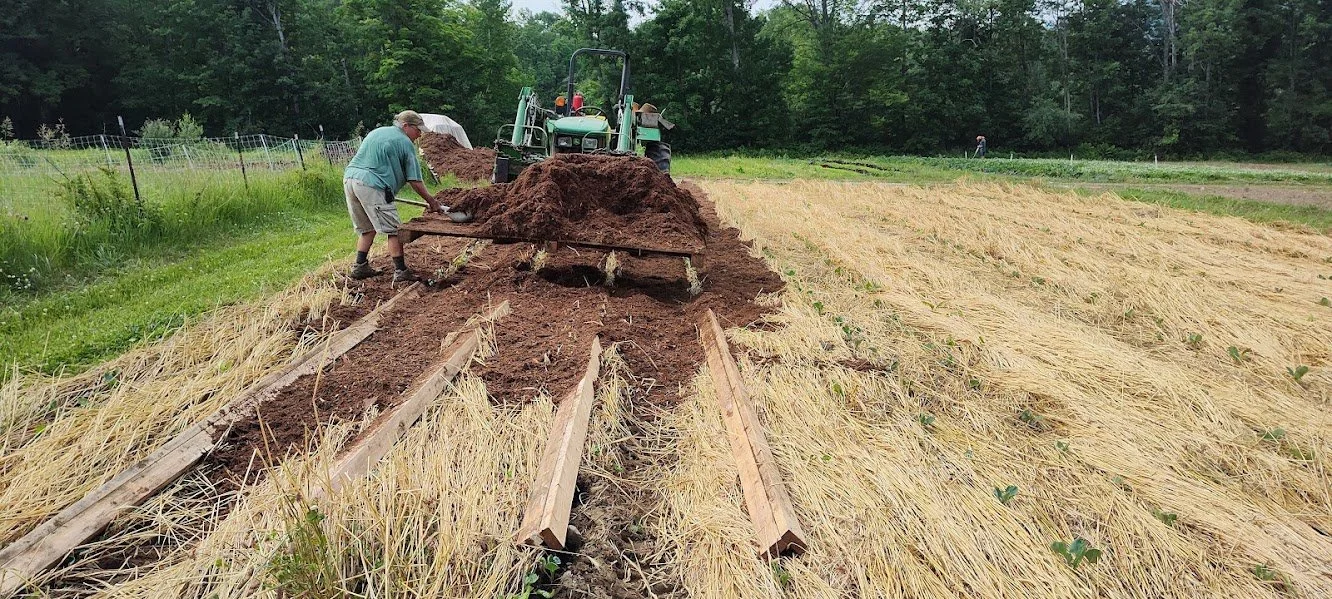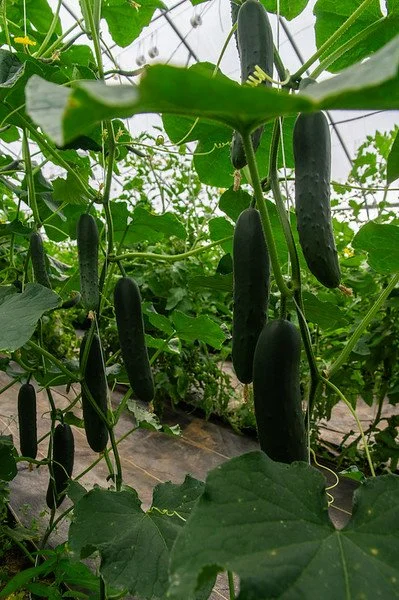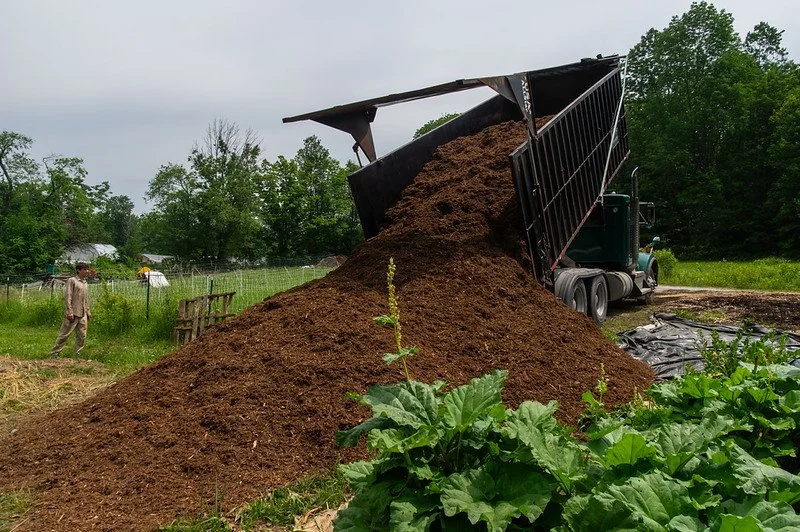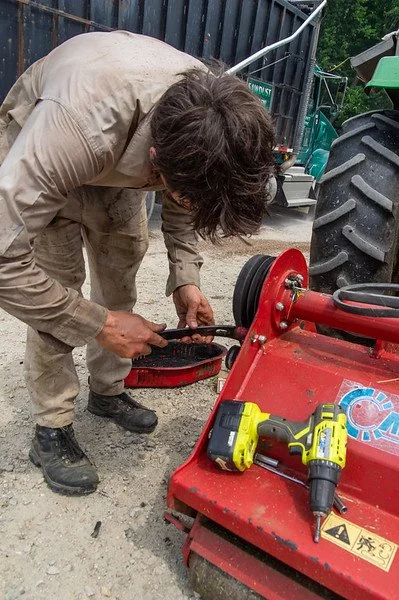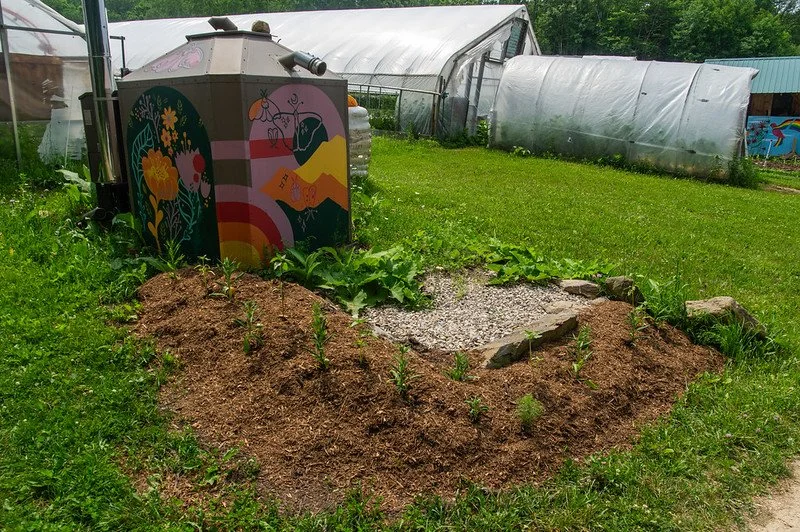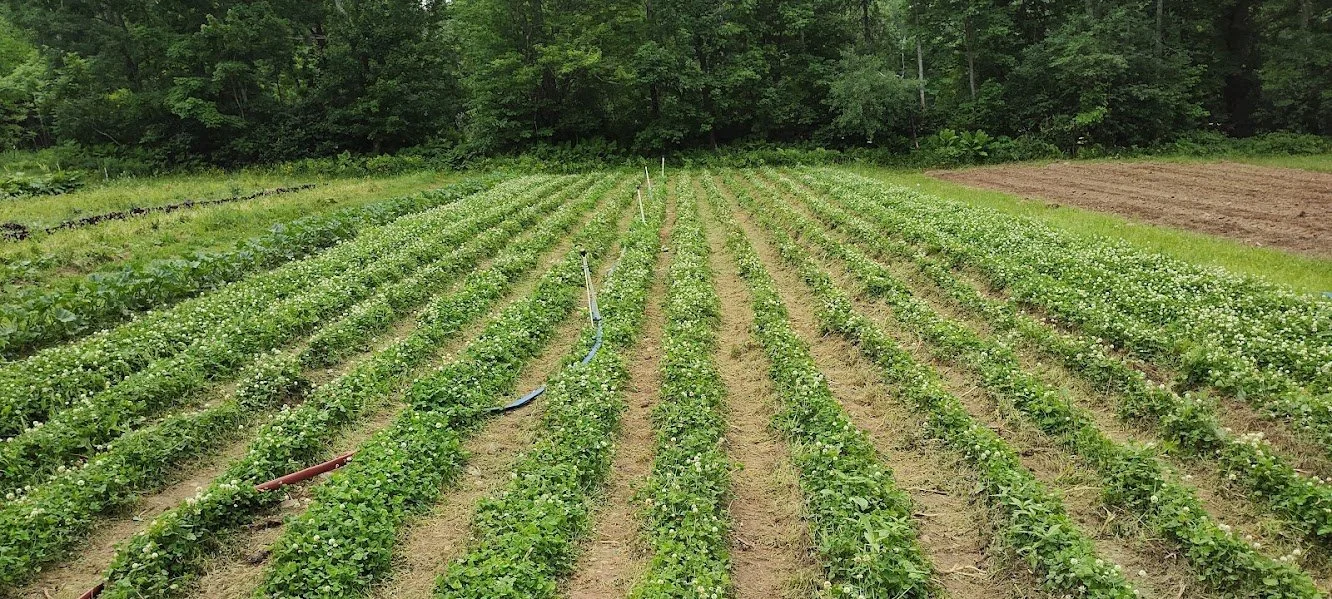3rd Week of the Summer CSA Season: Week of June 25th
Taylor and Katie harvesting beets, photo by Adam Ford
This Week’s Availability
This week we will have fresh beet bunches, fresh carrot bunches, scallions, slicing cucumbers, broccolini, garlic scapes*, salad turnips, bok choi, radishes, cilantro, green curly kale bunches, lacinato kale bunches, rainbow chard, baby kale mix, pea shoots, spinach, arugula, baby lettuce, rhubarb, sugarsnap peas, some summer squash, green zucchini, and costata romanesco zucchini**.
*Garlic scapes are a seasonal treat I absolutely love. They are the flower top of a garlic plant that we snap off this time of year to force the plant to put energy into making larger bulbs. The scapes are tender and garlicky and can be used like garlic. We especially love making garlic scape pesto with it, which is generally garlic scapes, olive oil, sunflower seeds, salt, and lemon, and is excellent on anything. You can also toss garlic scapes with olive oil and salt and put them on the grill and they end up like a lovely garlicky grilled asparagus experience.
**Costata romanesco is an Italian heirloom zucchini variety, with a less watery texture and a delicious, nutty flavor as compared to a traditional green zucchini. I wouldn’t describe myself as a traditional zucchini fan, but I really enjoy cooking with and eating the costata romanesco variety.
This is a brussels sprout field planted directly into a killed cover crop. The tall rye/clover cover crop was flattened and tarped with old greenhouse plastic during an early June hot spell, to kill the rye from the intense heat under the clear plastic. You can see how effectively the cover crop has been turned into a mulch! However, it was not hot enough at the soil level to kill the thousands of tiny germinating purslane seeds: a heat-loving succulent weed that you probably have encountered in your garden. So this field is being mulched with a thick layer of ash bark to smother those weeds. To speed up the mulch application process, Ryan and Cindy put together these 2x4s, set over the little brussels sprouts transplants so the mulch could be applied rapidly without smothering the small seedlings. Farmers are always coming up with clever ways to speed up the work! photo by Ryan
Farm News
Another great week around here: the second field of brussels sprouts were planted, SO MANY tomato and cucumber plants were trellised and pruned, the last round of potatoes were planted, some weeding was attended to, more mulching, and some other smaller transplantings were put out. When the cucumber plants were trellised, they were tall enough this week to lower the plants on their rolling trellis, which I am really tickled by. I love the possibility for cucumber plants to gross excessively tall, but to also be able to lower the vines so they harvest is always within reach without stilts. (And yes, we do have a pair of drywall stilts that have been used for tall cherry tomato harvests!)
This week’s good news in farming is that the Vermont legislature was able to override the governor’s veto on H.706, the Pollinator Protection Act, that was overwhelmingly supported by the vast majority of the Vermont farming community. This is an important first step in protecting pollinators from toxic neonicotinoids, and therefor protecting our food supply by doing what we can as humans to preserve pollinators into the future.
This week, as a person who didn’t grow up in a community celebrating the importance of Juneteenth, I spent some time sitting with how as a parent and farmer, I can support meaningful space and moments for this holiday with our kids and farm since farming is so deeply intertwined with historical and continued institutional racism. High Mowing Seeds (the organic seed company we get most of our seeds from) shared this, that I loved: “On Juneteenth, we honor the end of slavery in the United States, commemorating the day news of emancipation finally reached enslaved people in Galveston, Texas. Today, we celebrate the liberation of enslaved Africans and African-Americans and recognize the ongoing struggle against racism in its many forms. We acknowledge that agriculture carries a long legacy of racism, from stolen land to slavery, indentured servitude, segregation, unequal access to agricultural resources, and more. Land is intertwined with the harm inflicted upon it and through it. As an organic seed company, we see seeds as symbols of hope and vehicles of justice. Not only do they represent new beginnings, but they also serve as archives of the past. Seeds anchor us to place and to each other, as we seek to create a more just and equitable future.” It is our hope that our work of growing vegetables can be done in a way that is building a more equitable future for everyone.
Next week we will do some catch up weeding, plant an experimental patch of different strawberries for next year, mulch a few more zones, and continue to trellis all the wild plants in the tunnel…. they just keep growing!
Have a great week,
-ESF Team: Ryan, Kara, K2, Cindy, Galen, Katie, Taylor, Vanessa, Bryan, and Evan (and Sky and Soraya)
Plain garlic scape pesto is a true favorite around here, but this recipe is a twist on that favorite and uses the tops of carrots as well!
beets on the spray table, photo by Adam Ford
just as photogenic close up, photo by Adam Ford
cucumber plants loaded with fruits, photo by Adam Ford
allium flowers are some early food sources for native bugs, photo by Adam Ford
Two beds of potatoes covered in insect netting, photo by Adam Ford
the flower between the lacinato kale plants is some beneficial flowers and plants we transplanted among the transplants in the field… this increases habitat for beneficial insects right in each row, where we need them the most, not just relegated to one flower garden away from the fields, photo by Adam Ford
another load of ash bark mulch, photo by Adam Ford
Ryan making a repair to the flail mower, photo by Adam Ford
favorite picture of the week: Soraya sat down with Cindy to watch her changethe blades on the tractor mower, and Cindy gave her some instruction about what she was doing. There is so much we appreciate about this place, and Cindy is one of those special gems: I love having skilled female role models for our kids to learn from, photo by Kara
We'll structured, crumbly soil in the clover field, photo by Ryan
we make sure to have blooms throughout the season to create reliable habitat for pollinators, photo by Adam Ford
outdoor pepper plants beginning to grow out of early nutrient deficiency, photo by Adam Ford
peaking through some grape vines by the honey bee hives, with a view of one of the bluebird boxes the kiddos made at an event with the Shrewsbury Conservation Commission last year. A pair of tree swallows is almost done raising 5 baby birds in this box now, photo by Adam Ford
pellet hopper, photo by Adam Ford
Clover field with rows mowed to prepare for planting, photo by Adam Ford
Finished compost applied to the rows and brussels sprouts are planted, photo by Adam Ford
Keeping milking goats has always been a source of joy and relaxation for me among the hustle and bustle of vegetable production. It’s neat to watch as Soraya seems to have the same affinity for the goats, and how they also seem to bring out a sense of calm and grounding for her high energy, constantly moving 5-year old body, photo by Kara


